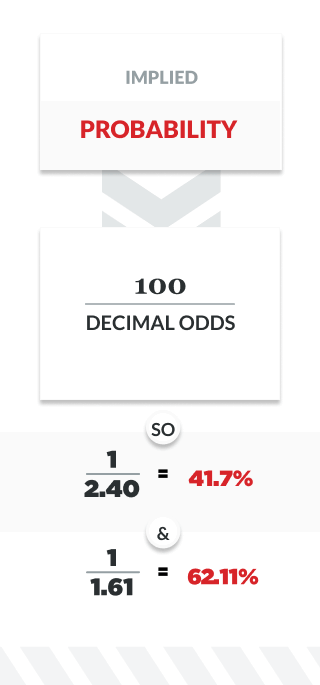Calculating Sports Odds
The sports betting odds calculator allows you to convert betting odds across American and Decimal odds. The odds calculator will also tell you the equivalent implied probability of winning as well as return and profit given a bet amount. Fields with a yellow background are editable. American odds are displayed in hundreds and thousands (-110, +500, +1500, etc). Be sure to enter the minus sign (-) if applicable to your odds. Calculating parlay odds is simple when using decimal. The odds for Same Game Multis are calculated differently and are different to the Multi Calculator on this website. Some bookmakers now also allow bettors to 'cash out' before all legs of their multibet have resulted. How to Bet On Sports Calculating Sports Betting ROI. Return on investment is a performance measure used to evaluate the efficiency of an investment. To calculate ROI, the return of an investment (or in this case, the profit earned from your sports betting system) is divided by the cost of the investment with the result typically being expressed on this website as a percentage. Mobile friendly moneyline calculator and sports betting calculators. Display payouts based on odds wagered. Money line calculator, Gambling calculator, Point spread calculator, Parlay calculator, Over/Under Calculator.
Sometimes it is necessary to figure out the average odds from a set of betting odds which can then be used as the basis for further calculations. For example, computing deviation and variance.
Calculating Payouts Sports Odds
When using odds in European format (decimal) you can be forgiven for thinking that average betting odds are simply computed by building the arithmetic mean of the data to be analysed. Unfortunately, this is the wrong approach and leads to a deceptive result.
Calculating Sports Odds
As a reminder, European odds are calculated as the reciprocal of the statistical probabilities of each event:
and vice versa … The implied probabilities are the reciprocals of the odds:
In effect, European odds are ratios/relations representing the likelihood of an event happening in comparison to each other event (e.g. a bet priced at odds of 4.0 is half as likely to win as a bet with odds of 2.0).
If these ratios are averaged using arithmetic mean (a common error), high data points are given greater weights than low data points. (e.g. working out the arithmetic mean of a set of 20 odds, 19 of them between 2.0 and 2.4, would be skewed if the 20th figure was, say, 15.0).
The correct approach is to calculate average odds by forming the harmonic mean!
The harmonic mean is defined as the reciprocal of the arithmetic mean of the reciprocals of x1, x2, …, xn (the odds):
As the reciprocals of betting odds are the implied probabilities of the events, one can calculate the harmonic mean as a reciprocal of the average probability of the respective bets:
The above equations rearranged facilitates the harmonic mean calculation by dividing n (the number of matches) by the sum of the reciprocals of the odds:
Or alternatively… dividing n (the number of matches) by the sum of their individual probabilities:
The Result (Harmonic Mean) is the Accurate Average of the Betting Odds.
Calculating Sports Odds
Excel users employ the following formula: =HARMEAN(number1,number2,…)




